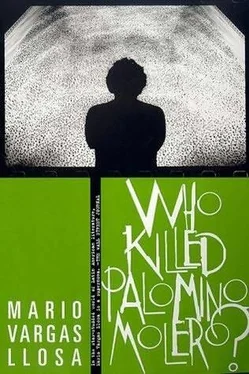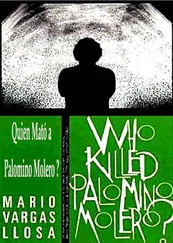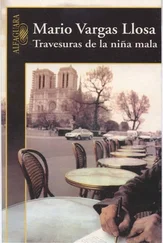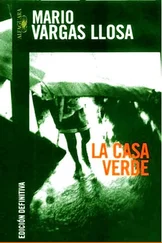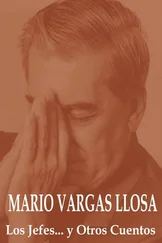“But I haven’t come about this and I’m not going to continue talking about my family with you,” the colonel cut in sharply. He changed voices again, softening his tone: “I don’t want to waste your time, Lieutenant.”
“I don’t even exist for him,” thought Lituma. It was better that way. He felt safe knowing he’d been forgotten, abolished, by the colonel. There was an interminable pause in which the colonel seemed to be desperately fighting against his own loss of speech, trying to pronounce some rebellious and fugitive words.
“You’re not wasting my time, Colonel.”
“I’d appreciate it if you wouldn’t mention this matter in your report,” he finally blurted out with difficulty.
“You mean about your daughter? About her hinting that you’d taken advantage of her?”
“I’d appreciate it if you didn’t mention it in your report,” he repeated in a surer voice. He passed his hand over his mouth and added, “Not for my sake, but for hers. This would have been a banquet for the newspapers. I can just see the headlines, all that journalistic pus and poison raining down on us.” He coughed, gasped, and made an effort to seem calm before he murmured: “A minor has to be protected from scandal. At any price.”
“I have to inform you, Colonel,” Lituma heard the lieutenant say, “that I didn’t mention the matter because it was so vague, and also because it wasn’t relevant to Palomino Molero’s murder. But don’t think that’s the end of it. When the affair becomes public, if it does, everything will depend on what your daughter says. She’ll be harassed, pursued day and night by people trying to get her to make statements. And the dirtier and more scandalous they are, the more they’ll exploit them. You know it. If it’s as you say, if she suffers from hallucinations, delusions-is that what they’re called?-it would be better to put her in a sanatorium, or send her abroad. Pardon me for sticking my nose into your personal life.”
He stopped talking because the colonel’s shadow had made an impatient gesture.
“Since I didn’t know if I’d find you, I left you a note at the station, under the door,” he said, ending the conversation.
“Understood, Colonel.”
“Good night,” the colonel said in his cutting voice.
But he didn’t leave. Lituma watched him turn around, take a few steps toward the shore, stop, his face toward the sea, and stand stock-still. The beacon from the lighthouse momentarily revealed the short, imperious figure dressed in khaki. Lituma and Lieutenant Silva exchanged indecisive looks. Finally the lieutenant signaled that they should leave.
They walked away without saying a word, the sand muffling their footsteps. They left the colonel and wended their way through the boats toward Talara. When they reached the town, Lituma turned to look back at the beach. The colonel’s figure, a shadow lighter than the shadows around it, stood in the same spot. Out at sea, there were twinkling yellow lights scattered along the horizon. Which of those lanterns was hanging on Don Matías’s boat?
Talara was deserted. There were no lights shining in the small wooden houses. Lituma had many things to ask about and comment on, but he didn’t dare open his mouth, paralyzed as he was by an ambiguous sensation of confusion and sadness. Could what the colonel told them be the truth? Maybe it was. That’s why he’d thought the girl had seemed nutty; he wasn’t wrong. At times he watched Lieutenant Silva out of the corner of his eye: he had the guitar on his shoulder, as if it were a rifle or a hoe, and seemed pensive, distant. How could he see with those sunglasses on?
When the shot went off, Lituma jumped. At the same time, it was as if he’d been expecting it. It broke the silence, briefly and brutally, and made a dull echo. Now everything was quiet and mute again. He stood still and looked at the lieutenant. After stopping for a moment, he began walking once more.
“But, Lieutenant,” said Lituma, trotting to catch up, “didn’t you hear?”
The officer was walking even more quickly now.
“Hear what, Lituma?”
“The shot, Lieutenant. Over on the beach. Didn’t you hear it?”
“I heard a noise that might have been a thousand things, Lituma. A drunk farting, a whale burping. A thousand things. I have no proof that noise was a shot.”
Lituma’s heart pounded. He was sweating and his shirt clung to his back. He was walking next to the lieutenant, shocked, stumbling, not understanding a thing.
“Aren’t we going to see about him?” Lituma asked, suddenly feeling dizzy.
“To see what about him, Lituma?”
“To see if Colonel Mindreau killed himself, Lieutenant. Wasn’t that the shot we just heard?”
“We’ll find out soon enough, Lituma. Whether it was or not, we’ll find out soon enough. What’s your hurry? Wait until someone comes, some fisherman, a bum, someone’ll find him and tell us. If it’s true that gentleman killed himself, as you seem to think. Better yet, wait until we’re back at the station. It may be that the mystery that’s tormenting you will be cleared up there. Didn’t you hear the colonel say he’d left us a note?”
“So you think that note will be his testament, Lieutenant? That he came looking for us knowing that after he talked to us he was going to kill himself?”
“Damn but you’re slow, boy,” said the lieutenant, sighing. He patted Lituma on the arm to raise his spirits. “Well, you’re going to have to go through a lot, but soon you’ll understand how things work. See what I mean, Lituma?”
They said nothing more until they reached the station, a run-down little house with peeling paint. A cloud hid the moon, and the lieutenant had to light a match to find the lock, and he had to twist the key around a lot, as usual, before it yielded. Lighting another match, he searched the floor, beginning at the threshold and working his way in, until the match burned his fingers and he had to blow it out, cursing. Lituma ran to light the paraffin lamp, which he did so awkwardly it seemed to take an age. The little flame finally caught on: a red tongue with a blue center that flickered before blazing up.
The envelope had slipped between two floorboards, and Lituma watched the lieutenant hunker down and carefully pick it up as if it were a fragile and precious object. He already knew the motions the lieutenant would make and in fact did make: he pushed his cap back on his head, took off his sunglasses, and sat down on a corner of the desk with his legs spread wide. Then he very carefully tore open the envelope and used two fingers to pull out a small, almost transparent white paper. Lituma could make out the lines of even writing that covered the entire page. He brought over the lamp so his boss could read more easily. Filled with anxiety, he saw the lieutenant’s eyes move slowly from left to right and back again, and his face slowly twisted into an expression of disgust or perplexity, or perhaps both things.
“Well, Lieutenant?”
“Holy shit,” he said, letting the hand holding the white paper drop down to his knee.
“Did he kill himself? Will you let me read it, Lieutenant?”
“That son of a bitch takes the cake.” Lieutenant Silva handed him the letter. As he read, believing and not believing, understanding and not understanding, he heard the lieutenant add: “He not only killed himself, Lituma. The son of a bitch killed the girl, too.”
Lituma raised his head and stared at the lieutenant, not knowing what to say or do. He had the lamp in his left hand, so those shadows jumping on the walls meant that he was trembling. A grimace deformed the lieutenant’s face, and Lituma saw him blink and squint, as if the glare were blinding him.
“What do we do now?” he stuttered, feeling somehow guilty of something. “Go to the base, to the colonel’s house, to find out if he really killed the girl?”
Читать дальше
